
“Options Are Slim”: Bruce Willis’ Wife Shares Heartbreaking Update On Husband’s Dementia Battle
Bruce Willis’ wife, Emma Heming Willis, gave an update about his ongoing health battles. After viewing the documentary Little Empty Boxes about filmmaker Max Lugavere’s mother’s battle with dementia, she posted on Instagram that she knows “options are slim” for treating the condition.
The 68-year-old actor, best known for his roles in “Die Hard,” “Pulp Fiction,” and many other films and TV shows was diagnosed with frontotemporal dementia (sometimes called FTD) earlier this year, his daughter shared on Instagram. He had been suffering from aphasia, a speech-impeding neurological condition since 2022 which pushed him to retire from acting.
More info: Instagram
In February of this year, Bruce Willis’ family shared the tragic news that the world-famous actor was suffering from frontotemporal dementia
Image credits: emmahemingwillis
Image credits: 20th Century-Fox
Image credits: Hollywood Pictures
Image credits: emmahemingwillis
Image credits: emmahemingwillis
Image credits: emmahemingwillis
After viewing a documentary on a filmmaker’s struggle with the condition, she shared her feelings about going through something similar
Image credits: emmahemingwillis
After being diagnosed with a brain condition, Bruce Willis has stepped back from his acting career
Last year, the Willis family unexpectedly announced Bruce Willis’ retirement from acting, citing his diagnosis of aphasia, a language disorder that is a result of damage to certain areas of the brain. People with this condition can find it hard to speak and understand words, so he took the natural decision to step away from his career. Sadly, in February of this year, the family announced that the condition had progressed and Bruce had been diagnosed with frontotemporal dementia (FTD). After a screening of Max Lugavere’s documentary “Little Empty Boxes,” on his mother’s struggle with dementia, Emma Heming Willis posted some of her thoughts to Instagram. “When you live the world of dementia you know that options are slim. But some won’t take that lying down which is how change is made and I got to witness the beauty in that last night.”
The condition is a result of gradual damage to the brain that ends up making it hard for a person to communicate and understand words. It can also cause personality changes, including impulsive or selfish behavior, neglect of personal hygiene, and a lack of motivation. This can make it hard to diagnose FTD, as people attribute the shift in behavior to aging or lifestyle changes. Frontotemporal dementia is more common among people aged 45-65 but often remains hidden until symptoms grow more severe. The condition affects 0.01–4.61 per 1000 persons a year, but researchers believe that many cases go undiagnosed. FTD is a more uncommon form of dementia, constituting roughly 5% of all dementia cases.
FTD progresses over time, meaning that people suffering from it will experience worse and worse symptoms as time goes on. This can include memory loss and hallucinations. The life expectancy ranges between two and ten years, but cases will vary. Generally, a person with FTD will need a dedicated caregiver, as they will slowly lose the ability to look after themselves. Scientists believe that some people can be genetically predisposed towards FTD, as a third of patients have a family history of some form of dementia.
Image credits: emmahemingwillis
Image credits: emmahemingwillis
Image credits: emmahemingwillis
Image credits: emmahemingwillis
Sadly, even with modern medicine, there is not much doctors can do to treat FTD
Treatment options remain limited and often families are left to deal with the symptoms and quality of life of the patient, but not the condition itself. There are still no medications that can effectively fight or slow frontotemporal dementia. Families or caregivers are instructed on how to make a home safe and comfortable for someone with FTD and normally the patient will receive physical therapy to help maintain their mobility. Speech therapy is used to help maintain some ability to communicate, but in some cases, the patient loses the ability to speak. Anti-epileptic agents and oxytocin are used to help regulate manic or hostile behavior, but the grim reality is that there is currently no way to cure someone of FTD.
The Willis family received an outpouring of public support from fans and other celebrities, including Bruce’s ex-wife, Demi Moore, as their Instagram comments are full of well-wishers and people sharing their own experiences with dementia. Emma Heming Willis and the Willis family are working to help raise awareness about dementia and encourage people to support the Association for Frontotemporal Degeneration (AFTD.) “We have been so moved by the love you have all shared for our dear husband, father, and friend during this difficult time. Your continued compassion, understanding, and respect will enable us to help Bruce live as full a life as possible,” the family added in a joint statement.
Commenters shared words of support for the Willis family and shared their own experiences with dementia
Explore more of these tags
He is surrounded by love and that's a language anyone can understand. Blessings for him and his family.
As a carer I watched people I was close to slowly disappear. I agree with the comment about spending money on this research instead of sending people into space. As humans we really need to sort out our priorities. It is so cruel. The person knows they are going. And then they are fine and then they gone then are fine and you have to watch. You have to see them deal with it...my favourite client was Maureen. She went from choosing her jewellery and outfit each day and giving me very sound relationship advice to not even being able to swallow, not able to roll over, not able to say to the other carers I don't like that! (I knew she didn't like that I stood up for her as much as I could) the vegetable state lasts waaaay too long. What worse torment for the afflicted and those trying to help can you imagine? think my Mother has it actually.
The thing about the money is: we actually don't have to choose between space or medical research. The sad truth is at least some money is spent on research and if wouldn't be spent for space it wouldn't reach the medical research neither because if there was enough interest that money ends there it would end there. It's not that not enough money is available, there is plenty of it. The issue is the distribution of it. Often enough research in a field like this only happens because a very influential person is hit by the fate. But most of the population doesn't care enough about such topics that there would be a pressure to invest into more research.
Load More Replies...Death comes to all of us &, honestly, I wouldn't want it otherwise. Disease is also something we deal w/daily & struggle to overcome, until we can't. Such is life. That said, dementia (in all its modes) is so cruel to everyone. Losing your memories, your *self* is torture. I fear that like nothing else. My love & good vibes to all of you enduring through this.
He is surrounded by love and that's a language anyone can understand. Blessings for him and his family.
As a carer I watched people I was close to slowly disappear. I agree with the comment about spending money on this research instead of sending people into space. As humans we really need to sort out our priorities. It is so cruel. The person knows they are going. And then they are fine and then they gone then are fine and you have to watch. You have to see them deal with it...my favourite client was Maureen. She went from choosing her jewellery and outfit each day and giving me very sound relationship advice to not even being able to swallow, not able to roll over, not able to say to the other carers I don't like that! (I knew she didn't like that I stood up for her as much as I could) the vegetable state lasts waaaay too long. What worse torment for the afflicted and those trying to help can you imagine? think my Mother has it actually.
The thing about the money is: we actually don't have to choose between space or medical research. The sad truth is at least some money is spent on research and if wouldn't be spent for space it wouldn't reach the medical research neither because if there was enough interest that money ends there it would end there. It's not that not enough money is available, there is plenty of it. The issue is the distribution of it. Often enough research in a field like this only happens because a very influential person is hit by the fate. But most of the population doesn't care enough about such topics that there would be a pressure to invest into more research.
Load More Replies...Death comes to all of us &, honestly, I wouldn't want it otherwise. Disease is also something we deal w/daily & struggle to overcome, until we can't. Such is life. That said, dementia (in all its modes) is so cruel to everyone. Losing your memories, your *self* is torture. I fear that like nothing else. My love & good vibes to all of you enduring through this.

 Dark Mode
Dark Mode 

 No fees, cancel anytime
No fees, cancel anytime 












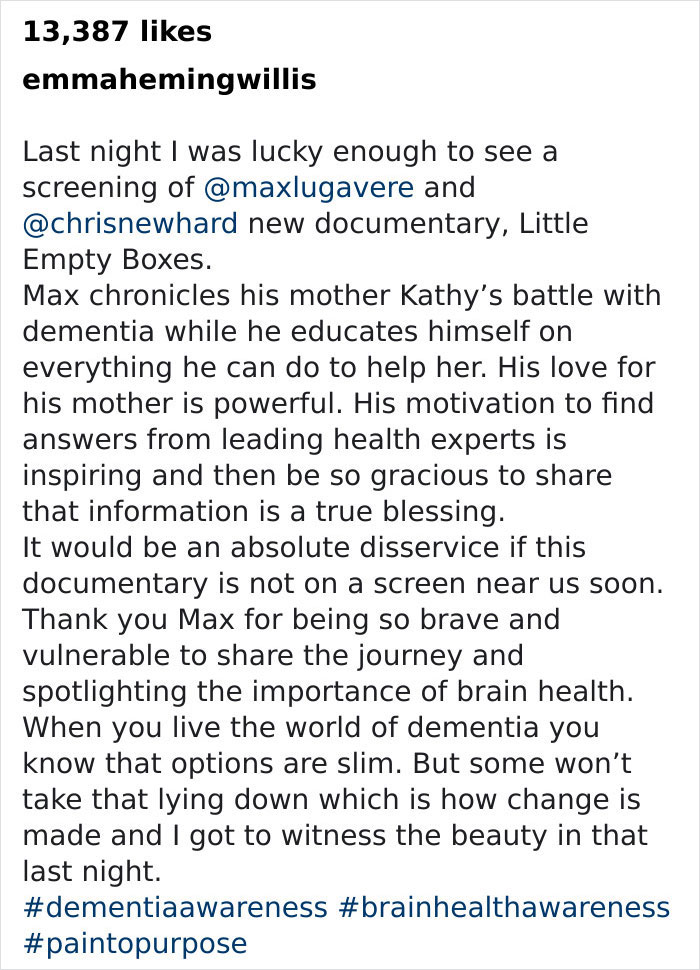
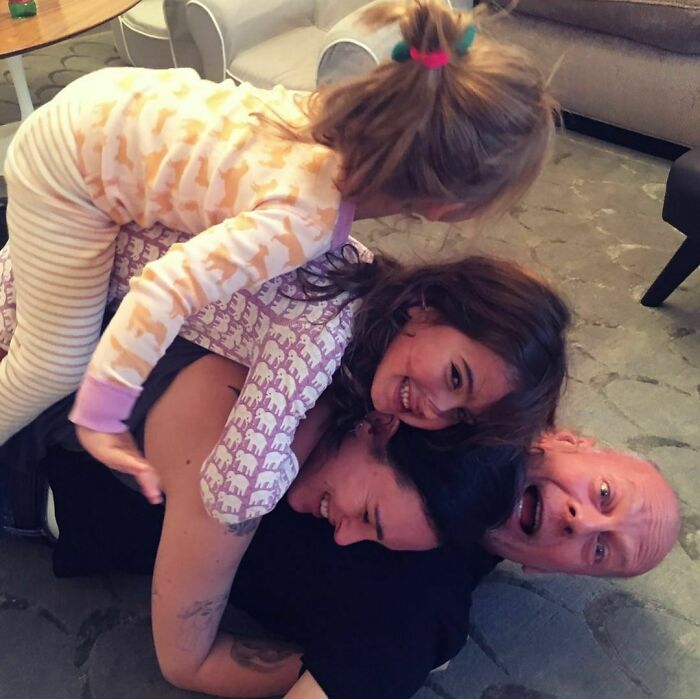

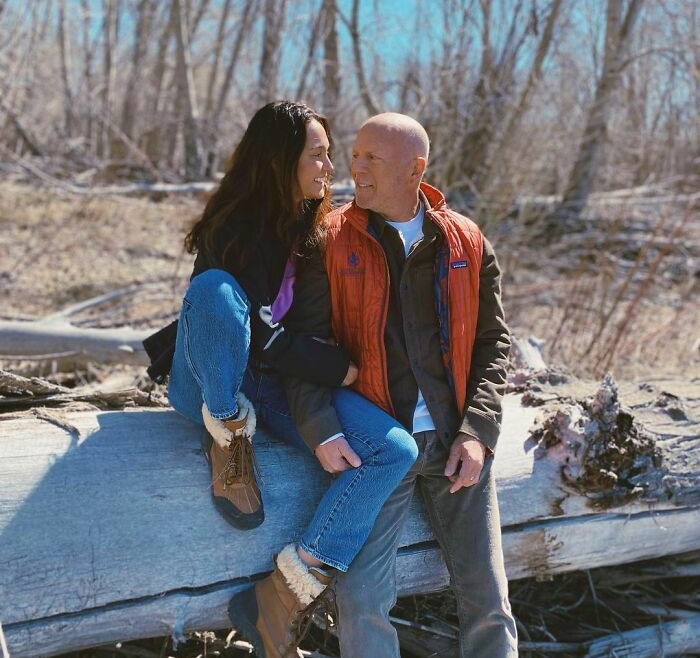



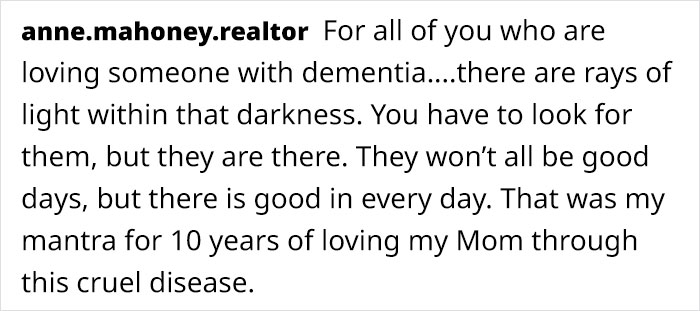
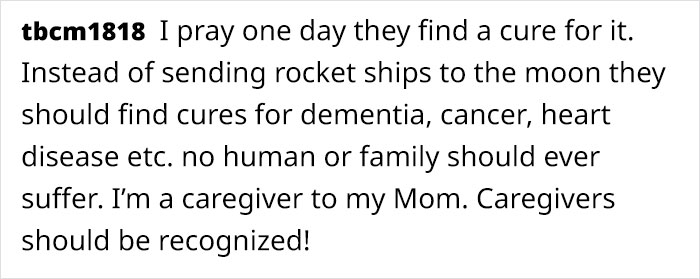
















































102
12